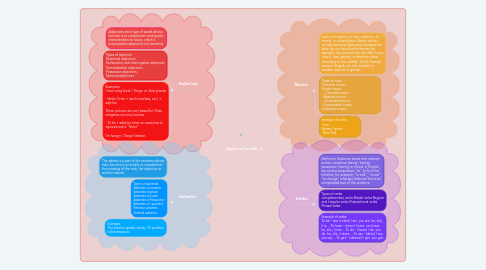types of words
by Daniela Urquijo

1. Adjetives
1.1. Adjectives are a type of words whose function is to complement and specify characteristics to nouns, which it accompanies adjacently in a sentence.
1.2. Types of adjetives Relational adjectives Exclamatory and interrogative adjectives Demonstrative adjectives Possessive adjectives Numeral adjectives
1.3. Examples: I have a big book / Tengo un libro grande - Verbo To be + (am/is/are/was, etc.) + adjetivo These pictures are very beautiful / Esas imágenes son muy bonitas - To be + adjetivo tiene en ocasiones la equivalencia a "Tener" I'm hungry / Tengo hambre
2. Adverbs
2.1. The adverb is a part of the sentence whose main function is to modify or complement the meaning of the verb, the adjective or another adverb.
2.2. Types of adverbs Adverbs of manner Adverbs of place Adverbs of tyme Adverbs of frequency Adverbs of quantity Relative adverbs Ordinal adverbs
2.3. Example: The teacher speaks slowly / El profesor habla despacio
3. Nouns
3.1. noun is an object, an idea, a person, an animal, or a fixed place. Nouns do not include pronouns (pronouns) because the latter do not have fixed referents (for example: the pronoun she can refer to any object, idea, person, or feminine place according to the context). Unlike Spanish, nouns in English are only variable in number, and not in gender
3.2. Types of noun Common nouns Proper nouns ...Concrete nouns ..Abstract nouns: ...Countable nouns: . ..Uncountable nouns. ... Collective nouns:
3.3. example of verbs love Britney Spears New York
4. Verbs
4.1. Definition: Verbs are words that indicate actions, existence (being / being), possession (having) or mood. In English, we use the preposition "to" to form the infinitive, for example: "to talk", "to eat", "to change" (change) Verbs are the most complicated part of the sentence
4.2. Types of verbs complementary verbs Modal verbs Regular and irregular verbs Prepositional verbs Phrasal verbs
4.3. Example of verbs To be – (ser o estar) I am. you are. he, she, it is. ...To have – (tener) I have. you have. he, she, it has. ...To do – (hacer) I do. you do. he, she, it does. ...To say – (decir) I say. you say. ...To get – (obtener) I get. you get.


